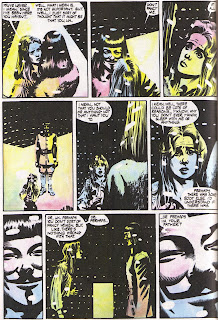 often frustrate or complicate the search for meaning, especially in so far as it relates to their own desire. The same, of course, can be said of Moore himself, whose stories leave the reader holding the bag, as it were.
often frustrate or complicate the search for meaning, especially in so far as it relates to their own desire. The same, of course, can be said of Moore himself, whose stories leave the reader holding the bag, as it were.One function of V's fixed expression and his tendency to speak in crytpic, highly citational language is to render his inner world inaccessible to both the characters in the novel as well as us. The abyss of his desire draws us in but also resists our attempts to pin down a definitive content behind his perpetual smile. Moore gives V no inner monologue to reveal his motivations and the glimpses we get of his past only comes through the writing of others. V, in other words, is an inscrutible void.
In a few moments of the novel, V's obtuseness clearly hystericizes Evey. The first hint at this comes when Evey questions why V has not attempted to sleep with her, although he has held her alone in his shadow gallery for so long. Following a dance, she poses a question to V. The next panel shows a close-up of V's always smiling face silently staring back at her. Next Evey questions V's sexuality--effectively she is guessing. Accompanying another even tighter close-up, V finally suggests that maybe he is her father. Although she grabs on to this possibility instantly, V tellingly blindfolds her and leaves her outside with no further explanation.

Her hysterisization continues when towards the end of the novel she chases after V as he prepares to exact his master-stroke against the government. Her frustration boils over when her questions about what she needs to do are met with yet more quotations, complaining, 'I hate this, all our conversations turn into crossword puzzles!' (223.5). Once again, V's static expression and refusal to provide easy answers leaves Evey at a loss for what he wants her to do.
As a character V doe snot provide answers but through his irritating refusal instead seems to open up hysterical questioning This places the onus for answering the questions that result on Evey and by extension the reader. By the end of V for Vendetta, one gets the sense of a negative critique of totalitarianism but all it provides in its place is the concept of anarachy. In this sense, Moore's text remains as inscrutible as his highly textual character, V.
Are there other examples of characters as embodiments of 'lack' in Moore's texts? Do they function in the same way?


